- Home
- A. A. Attanasio
Hunting the Ghost Dancer
Hunting the Ghost Dancer Read online
Hunting the Ghost Dancer
A. A. Attanasio
Hunting the Ghost Dancer
published by Firelords Press
Ignite your imagination!
second edition copyright © 2013 by A. A. Attanasio
ISBN: 9781301072569
http://aaattanasio.com/
Hunting the Ghost Dancer / A.A. Attanasio.
Originally published by HarperCollins 1991
Library of Congress Cataloging in Publication Data
CALL NUMBER: PS3551.T74H86
Cover art:
Matthew Attard
http://priteeboy.deviantart.com/
[email protected]
Five feathers for the flight of our senses — three talons for grasping heaven, earth, and the abyss — a gem for each of the six directions — and at the center: the spiral journey home, to the source.
For you —
worthy companion on our woundward journey
Fifty thousand summers ago,
we wandered a world stranger than we remember —
Contents
Prelude
)|(
Part One
Beyond the Shadow Is the Ghost
Blind Side
The Doom of the Blue Shell
Taiga
)|(
Part Two
Slitting the Belly of the Moon Bitch
Ghost Dancing
The Invisibles
Moon Bitch
Hunger Music
Eating Darkness
)|(
Part Three
Masterings of the Beast
For the Dead, Who Live Us
The Door of the Mountain
Lightfall in the Stone
South
Prelude
Sun sparked on the wings of a dragonfly. A lone figure watched the flitting insect disappear in sunny mists of rhododendron and barberry. Squinting against the late afternoon glare, he stared north across the flat terrain at a blue star on the horizon—a distant glacier.
Shadows of several woolly rhinos marred the level distance as they selected resting spots for the night, and a herd of yaks mulled along the rocky bed of a tributary stream that shone like ice in the hard light. Otherwise, the tundra appeared empty. A few flakes of snow, dropping from mare's tail clouds, glittered gold in the sun's slanting rays.
The robust man squatted alone on the spine of a ridge that marked the northern limit of the Great Forest. Behind him, a dark wall of shaggy pine and stout cedars admitted only fibrous sunlight. And when wind backwashed off the dense trees, resined air inspired memories of the thirty-five winters he had sheltered there.
Those were the winters he had counted. At the end of each, as now, when the snow lifted and silver lichen again crept out of the crevices in tree barks, he had cut a notch on his clan belt. His clan had cut seven for him before he had earned the right to mark his own time.
Using a wooden knife, he cut a nick in the leather of the belt just above his left hip. Then he untied the thongs of the elephant-hide belt and removed it from his waist. He sheathed the knife in the furry cuff of his boot so that he could pull the belt taut in both hands and hold it against the western horizon.
With one eye squeezed shut, he matched the notch he had just cut to a cleft in the tree-stubbled landscape, where the sun settled. This custom he remembered from his childhood. Each year at the coming of warm winds and flowers, the old ones held high the belts of all the clan members, one at a time.
Now there were no old ones. No clan.
Winter done, summer already pushing up from the dark earth, the tundra looked beautiful to the wanderer. Fiercely so, for he knew this would be his last warm season before he rejoined the People, who had gone ahead.
An old man now, he moved entirely alone on the pathways of the world. He had done so for eight winters. Like an ancient lonely elk, he wintered in the Forest, proud under the heavy antlers of his memories.
That pride proved hard to bear even in the most clement weather. In the snow and biting ice-winds his absent-minded daydreaming had almost killed him.
Once, he had been a great hunter in his clan, the Spear-Throwers. Too often now he curled up among his remembrances of the People when he should have been hunting, and he had survived only because the spirit powers had pitied him.
He knew he could not rely on the compassion of those benevolent spirits another winter. He had to find others of his kind before the harsh winds came down again from the cold plateaus. One more winter alone and he would fulfill the promise of his given name, Baat, which in grandfather-tongue meant "Hollow Bone."
Baat yearned to share what he had learned in his seasons of solitude, to hear once more the music of his youth, to huddle with others, and talk and laugh again before the journey with no return. And so he had found his way to the edge of the Great Forest earlier than usual to hold his year-notch up to the last sun of winter.
Baat lowered his arms and fastened the belt about his waist.
He purged his mind of sorrow: He would be with his clan soon enough. This was his last opportunity to savor the bounty of life, even if alone.
Looking out over the tundra to the north, the traditional summer path of the People, Baat felt deepening nostalgia for the perfections of summer. How easy to thrive in the days of flowers.
That he might never again wander with the herds, never fish among the boulders with the cranes, or smoke bees from their bracken hives and chew their sweet combs ached in him. Most of all, he would miss walking up to the glacier, staring into its blue depths, hearing its shatter-rock songs, feeling its cold under his feet while the day's styptic heat tightened his skin.
His reminiscence snapped at the sight of thin shadows appearing out of the glare of the glacial stream. Grazing yaks casually lumbered away from these sudden figures.
Baat crouched lower.
The slim shadows resolved to people, not the People, but creatures of another breed: the smallheads, narrow ones whom he often saw in the Forest and on the tundra. Dangerous by day, they traveled always in bands. Cunning hunters, the smallheads hated him and his kind. Their hatred fed on murderous envy, because they could not share the cold fire that came down from the night sky—that cold fire which, with all its strength, voices, and pain, belonged only to the People.
Against the sun's red fire, the smallhead band stood out in sharp relief. Four men and a woman moved slowly along the stream’s stony margins. At first, Baat thought they carried a hunt prize among them.
Looking closer, he observed that the object trussed and hoisted between two of the men was another smallhead. They bore someone injured. On the flat tundra the litter could be dragged, but over the stream rocks the wounded one had to be lifted. With their burden, they would not reach the Forest before nightfall.
At that thought, a sexual flurry troubled Baat. He recognized that as an urgency of the cold fire. Night drew near enough for the cold fire to feel its way to him.
Ul udi was what the cold fire called itself. The name felt hard to speak, even silently. Much of what the ul udi said when their cold fire descended from the night and furred him in chill brightness he had no way to fit to his breath. Yet that hardly mattered, for he carried their cold fire, as all the People did. And in those cool, vivid flames thrived far more than speaking or understanding. The ul udi wanted rapture and blood.
Baat considered moving on, away from the smallheads. Far better for them if he slipped off now, back into the Forest. The erotic flimmer in his muscles protested with hot craving. Even if he left now, he could not go far before nightfall. And once the night came and the cold fire descended, the ul udi would bring him back for the blood of the smallh
eads.
He crouched, making certain that he had not been spotted. Though it seemed futile, he had to try to get away before night claimed him. If he stayed, there would be violence and more smallheads would come.
Bent over, he edged slowly backward. Once the cool shadows of the Forest closed around him, he turned and loped through the dark tree tunnels.
He knew well in which direction the smallheads' winter camp lay and where they journeyed in spring to set up their summer residence. Those were choice places in the Forest, near clear water springs and salt holes, where the People had once dwelled. The smallheads had driven off the People and made those places their own.
Baat ran hard away from there, into dense thickets, where wild pigs rooted and the Great Bear slept and the smallheads feared to go. When he could, he leaped from one root-arch of the giant trees to another and swung from thick lower limbs. More often, he crawled among bramble and clawed his way through winter-killed curtains of dead ivy and dodder, ignoring the scratches on his face and bare arms. If he could get far enough away from the smallheads, the ul udi would not smell them and would lose interest.
Already too late, he felt the erotic flutter steepen in him. The cold fire had come down from the sky. In the darkness of the Forest, he could see it glowing like moonmist on his limbs.
Soon the voices would begin. Soon he would wonder why he ran, why he let the little claws of the Forest cut him when the smallheads were the ones who should be fleeing. Were they not the ones who had intruded on him and the People? Had he forgotten that they had drawn first blood? They had murdered not only the hunters but the old ones, and the women, and the children. Did he not remember his own children, twisting in his arms with pain from the poisoned water they had drunk?
He stopped running.
His breath chuffed loudly from exertion, yet he could hear his blood thrumming even louder in his ears, his heart knocking hard at the root of his throat, where a cry coiled.
The smallheads are your enemy, a bitter voice spoke. The ul udi stood in him again. They had come down from the sky to live the life of the earth in him.
Baat held his hands up before his face. The space between his fingers webbed brightly with the radiance of the ul udi. The glow pulsed with his breathing.
Kill the smallheads, an ul udi voice said. And in the cold fire that he held in his hands he met again the faces of his children. Their large, bright eyes stared at him through pain, expecting him to help them, as he had always helped. He watched them die again. Their faces closed around their suffering, hot with tears and pain, not comprehending his helplessness. Da! they cried to him. Da—it hurts!
Baat's hands fisted, and the cry twisting about his heart uncoiled to a howl.
Kill the smallheads!
)|(
On the tundra, where the wanderers had stopped in their trek to build a fire against the night, the howl from the distant treeline sounded deathly. Two of the men rose from where they hunkered by the juddering flames, and shook their spears at the Forest.
The two women, one sitting in the litter, the other kneeling at her side, feeding her from a wooden bowl, shared a knowing look of apprehension. The other two men hugged themselves tighter beside the fire, and looked to the woman in the litter for directions.
"Deadwalkers begone!" the larger of the spearmen shouted, and the two began a dance to ward off phantoms.
"Have those fools sit down," the woman in the litter spoke.
"Sit down!" the squatting men yelled.
The dancers stopped. The large one said, "The dead are crying. We must drive them away."
"That is not the cry of the dead, you dolts," the woman in the litter spoke. "That is a ghost dancer."
The spearmen exchanged surprised stares. "You're mistaken, priestess," the big one said. "The Grandfathers have killed all the ghost dancers."
"Not all." The priestess waved away the bowl her attendant still held before her, and signed for her shoulders to be covered. The kneeling woman placed the bowl by the fire, got up, and draped the priestess' white shoulders with a bearskin.
"None of the Thundertree has ever seen a ghost dancer," the smaller of the spearmen said, while the other tentatively shook his spear over the fire. "Maybe you're wrong, priestess. Maybe these are our dead—unhappy that we are bringing you, a Longtooth priestess, to our people."
The priestess shared a mocking expression with her male escorts. "The Thundertree are fools, all of you, fools. You've lived too long in the Forest hiding like squirrels. You've forgotten the Ways of Wandering. That is why there are no great hunters among you. And that is why you need this." She lifted the fertility rock from her lap, where it had to remain to stay potent.
The Thundertree men looked away from it, afraid it would steal their virility and wither them to old age before their time.
The priestess laughed. She lowered the round, smooth stone to her lap and placed her fingers in its cleft. "Only what is in here can save your people. Without the rock of fertility to call great souls into the wombs of the Thundertree, your people will become more foolish with each generation—and soon enough not even the animals will talk with you. Only this rock can save you." She cooed to it as to a child. "And only I can carry the rock. So do as I say. Douse the flames, quickly, and carry me into darkness."
The Thundertree men turned away. "No," the smaller one objected. "In darkness the night beasts will feast on us."
"In the open, the ghost dancer will tear you limb from limb. We must hide. Quickly, do as I say."
"No, priestess," the larger hunter spoke. "For days we've done all that you told us, carrying you as you wished, stopping when you wished, eating what you wished. Now we see the Forest. Now the Thundertree know the ways. You will obey us. Have your Longtooth men gather more kindling and feed the fire."
The Longtooth men rose, spears in hand, and moved threateningly toward the fire. The priestess stopped them with a raised hand. "Fight each other and we will all die out here. The ghost dancer knows we are here. He comes for us!"
The Thundertree men clacked their spears together. "Then we will kill him as our Grandfathers killed the ghost dancers in their time. Feed the fire—and let this ghost dancer dare enter the light of our circle."
The Longtooth men looked urgently to their priestess. She signed for them to stay calm.
"You came to the Longtooth for help," she said to her Thundertree escorts.
"Many among us do not want your help. We will call forth our own great souls."
The priestess tossed her head with exasperation. "Then why have I been troubled to make this long journey? Why must I endure the rigors of winter's end, keeping this rock warm between my legs? If the Thundertree don't need us, why have we come this far?"
The Thundertree men conceded with weary nods. "You are needed," the short one admitted. "The hunt has been difficult for many years. There has been little meat. The women have provided most of our food. We alone are the two great hunters of our people."
"As they have reminded us since they came for us," the priestess smirked to her attendants.
"But"—the larger Thundertree hunter spoke up—"we are now in sight of the Forest. Our Grandfathers watch us from there. We cannot cower in darkness. Let this ghost dancer come for us—if that's what's out there."
"Oh, it is a ghost dancer out there, brave Thundertree hunters. It most certainly is. Look for yourselves." The priestess pointed to where the crest of stars ended abruptly at the bristly horizon of the Forest. In the darkness there, a blue light blinked. "He is still among the trees. Soon, he will break for us."
The female attendant gasped and began whimpering.
"Be still, Shala," the priestess ordered. "It is too late to hide now."
"The crystal will stop him, surely," Shala whispered.
"No. There is no moon tonight. The crystal is too weak."
"What are you speaking of?" the big Thundertree hunter asked.
"Shut up, Big Kell, and prepare to
fight for your life," one of the Longtooth men snapped. "You didn't want to hide, so now let us see your courage."
"You've killed ghost dancers before, Teshuk?" Big Kell asked.
Teshuk looked to his partner, and they grinned without humor. "Cort and me killed our share, eh, brother?"
"Not like this," Cort said, grin falling away. "They got to be killed asleep. When they sleep deep. Better to poison 'em, then jump 'em while they're cramped up. Never like this."
"Mudman! Look at that thing."
"Forget asking the Mudman for help, Vran," Teshuk grumbled. "Mudman isn't going to rise up to save your shivering shanks."
"What makes it burn like that?" Big Kell wanted to know.
The Longtooth men shrugged, looked to the priestess. She stared at the Forest with half-lidded eyes and did not appear to have heard them.
She was not really watching the blue light winking brighter and nearer. She thought about what was to come. The ghost dancer would certainly kill the men. But for her and Shala, if they showed submission—no, more than submission, willing desire—they might survive yet. The Thundertree dwelled not far. Two women could travel that distance alone.
Shala knelt beside the priestess and pressed a cold glass blade into the woman's hand. With tear-bright eyes and a sob in her voice, she begged, "Kill me, priestess. Be swift. Do not let the beast get me."
The priestess threw the black-glass knife into the fire and seized Shala by her hair, pulled her face up close. The priestess' stare fixed her with fierce intensity. "For the men there is only death," she whispered to the girl. "For us there is yet hope. You must give yourself to him. You must pretend he is your wished-for lover."
"No!" Shala cried and pulled away.
The priestess jerked her close again. "Do you want to die? Do you prefer the Mudman for your lover? Are we not women? Does not the Mother shine in us? Let Her shine brightly, dear Shala—and we may yet live!"

 The Conjure Book
The Conjure Book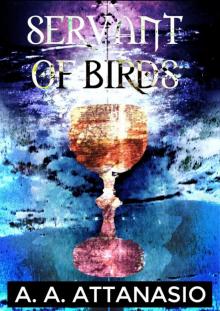 Servant of Birds
Servant of Birds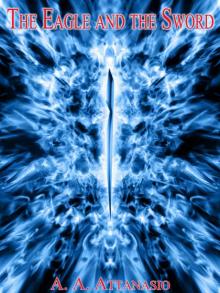 The Eagle and the Sword (The Perilous Order of Camelot Book 2)
The Eagle and the Sword (The Perilous Order of Camelot Book 2)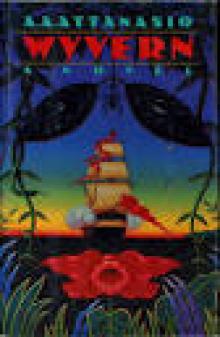 Wyvern
Wyvern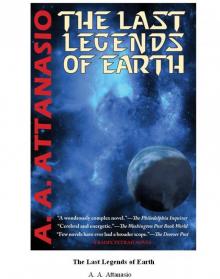 The Last Legends of Earth
The Last Legends of Earth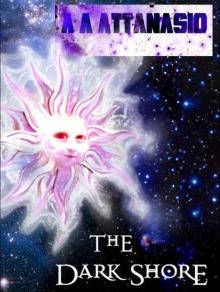 The Dark Shore (The Dominions of Irth Book 1)
The Dark Shore (The Dominions of Irth Book 1)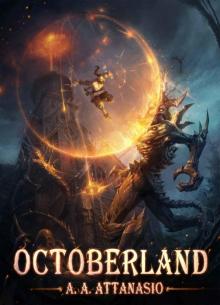 Octoberland (The Dominions of Irth Book 3)
Octoberland (The Dominions of Irth Book 3)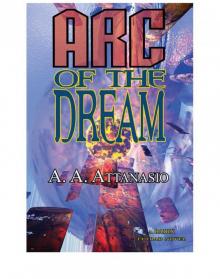 Arc of the Dream
Arc of the Dream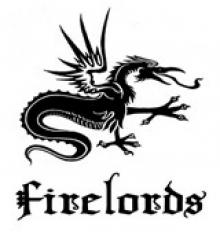 p1b6fn7sdh1ln0g4v1pkvkuqim54
p1b6fn7sdh1ln0g4v1pkvkuqim54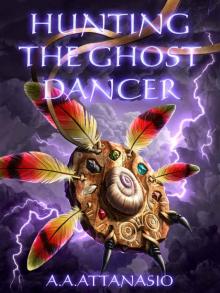 Hunting the Ghost Dancer
Hunting the Ghost Dancer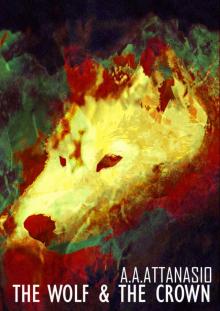 The Wolf and the Crown (The Perilous Order of Camelot Book 3)
The Wolf and the Crown (The Perilous Order of Camelot Book 3)